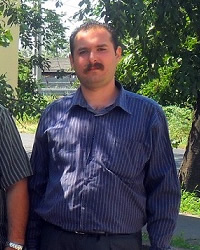In their homeland of India they were originally called Dom, meaning man. Later, Dom developed into Rom. Today, they prefer to be called Romani in Europe; but in the Middle East and North Africa, many still refer to themselves as 'Dom' or 'Domi'. Here, the term 'Dom' will be used for this people group found in the Middle East, and 'Romani' will be used as a general, more recognizable designation for the larger people group.
Originally coming from India, the Romani are now scattered throughout the world. Little is known today about the lives of the 2 to 3 million Dom who live in the Middle East. This is largely due to the closed communities they maintain. There are many fascinating folk tales about their origins that are still passed down from generation to generation.
Today, communities of Dom can be found in the following Middle Eastern countries: Cyprus, Iran, Iraq, Syria, Lebanon, Jordan, Israel, the Gaza Strip and the West Bank, and Turkey. Turkish speaking Romani are also present in Greece, particularly in the northeast. Survey work is still needed to determine the accuracy of reports that refer to Dom in Saudi Arabia, Kuwait, and the United Arab Emirates. Unfortunately, accurate population counts are difficult to secure in these countries. Too often, Dom are not counted in the national census, or they hide their identity on purpose.
Dom lifestyles vary widely. There are those who maintain a peripatetic (nomadic) lifestyle. They offer their services as entertainers, musicians, or metal workers to other nomadic groups. Also included in the nomadic lifestyle are those Dom who are migrant workers. They can be found harvesting crops in the Jordan Valley, as well as working in the tobacco fields in northern Jordan. Other tent dwelling Nawar move in and out of the Bekaa in Lebanon, as do the Bedouin. Few Dom in the Middle East are pastoralists. In some countries such as Iraq, donkey and camel caravans of Romani entertainers still move about the country featuring dancers, fortunetellers, musicians, jugglers, and acrobats. Others can be described as semi-nomadic: they live in houses in or near a city part of the year, perhaps during the winter, but live in their tents the remainder of the year. The houses they live in are often nothing more than tin huts. The Dom in Kurman, Iran, are an illustration of semi-nomadic people. They support themselves as craftsmen, peddlers, fortunetellers and dancers, among other occupations, in the streets of the cities. Often, their children beg in the streets rather than attend school.
The Dom people tend to adopt the dominant religion of their host country. For the Middle Eastern countries, this is Islam. To find Dom on the annual pilgrimage to Mecca is not unusual. While there are some devout Muslims among the Dom, the majority are only nominal Muslims. They consider religion a personal matter, and they are hesitant to talk about it with anyone. Superstition and "the good elements" of many religious systems make up the nature of their beliefs. Spiritism is dominant in their thinking as to why things happen in the world. They strongly fear evil spirits and curses. Dom fortunetellers offer to make clients a potion that will ward off curses.
There are very few known Christians among the Dom. One young man spoke about the isolation that a Dom feels when he or she becomes a follower of Jesus. As a result of accepting the Christian faith, they may find themselves outcasts, separated from their own families, as well as from the predominantly Islamic environment in which they live.
In almost all of the countries they live in, their rudimentary command of the local language and limited use of written documents have contributed to their political powerlessness. Some who have settled are in transition, as they seek to become a part of the social systems around them. In an effort to fit in, they may abandon the traditional clothing, tattooing, dancing and fortune telling that are part of the Romani lifestyle. They may even deny their ethnic identity.
Regardless of their efforts to assimilate into the mainstream society, the Dom rarely have official status or citizenship in their country of residence. Due to their poverty, they are often unable to pay hospital fees when children are born. In this case, no birth certificate is issued, so the possibility of securing citizenship is forfeited. The concept of owning land is not inherent to the nomadic Dom world view, and they find it difficult to adjust to such an outlook. Few families own the plots of land on which they locate their settlements or camps. Therefore, they are often subjected to forced relocation.
Scripture Prayers for the Romani, Romanichal in South Africa.
| Profile Source: Middle East Resources |










